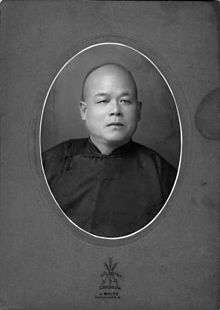Yip Sang
Yip Sang (Chinese: 葉春田; pinyin: Yè Chūntián; 1845–1927) was a prominent Canadian businessman, whose business and family flourished during the period when Chinese Canadians faced discrimination and restrictions.
Yip's fame was mainly in his business, but he was also a social reformer and political activist in Canada. Yip Sang was born on September 6, 1845, in Shengtang village (聖堂), Taishan County, Guangdong, into a poor family. Yip went to California as a general labourer in 1864 and then to work in the goldfields in Canada in 1881.

Yip arrived in Vancouver to work as a coal salesman, then as a bookkeeper, timekeeper, and paymaster for the Canadian Pacific Railway Supply Company. He quickly worked up the ranks and became a superintendent of Chinese labourers. Familiar with Chinese language and culture, Yip Sang was a valuable asset to the company in contracting labor from China. From 1881 to 1885, Yip Sang ended up overseeing 7,000 Chinese labourers for the Canadian Pacific Railway Company. [1] After the Canadian Pacific Railway was completed in 1885, Yip Sang returned to China.[1] There, he married additional wives and fathered more children. He fathered 23 children among his four wives, Lee Shee, Dong Shee, Wong Shee, and Chin Shee. By 1888, Yip had returned to Canada and started his own business the Wing Sang Company, which provided labour contracting, as well as import/export business to and from the Far East.

His company became a Chinese agent with his former employer, Canadian Pacific Railway Supply Company, providing human labour and produce.
Unlike most Chinese men of his time who worked in menial labor, Yip was viewed widely as a success story.
Yip was fluent in English, a naturalized British (1891) subject and by 1908 a successful business and real estate portfolio.
Within the Chinese community, Yip was a local leader. He helped establish the Chinese Benevolent Association of Vancouver, the Chinese Board of Trade of Vancouver and Life Governor of the Vancouver General Hospital. He helped create a hospital and public school for the Chinese community of Vancouver
Yip was also involved in the political movement in promoting political reform in China via the Chinese Empire Reform Association.
In 1901, Yip brought his entire family to Canada, a family that grew to 660 members by 1966. Some of his children were also able to succeed in life. His daughter, Susanne, attended the University of British Columbia and was later Principal of Kwangtung Provincial Girls’ Middle School in Guangzhou in the 1930s. His son, K. Dock Yip, attended Osgoode Law School and was one of the few Chinese Canadian lawyers before 1947.
Yip Sang died in 1927 and left a small fortune to his 18 sons. He is buried at Mountain View Cemetery.
As for Wing Sang Company, it was renamed Yip Sang Ltd. in 1950 and later the business disappeared from Chinatown.

The Wing Sang Building (1889) at 51 East Pender is one of the city's oldest buildings. It was occupied by Yip Sang Travel Agency Limited in 1955 and abandoned years later. Vancouver condo marketer Bob Rennie refurbished the building in the 2000s. It now holds the Rennie Collection of contemporary art.
Children
- Susanne Yip Gimling - principal and Professor at Sun Yat-sen University; retired in Canada
- K. Dock Yip - graduated from Osgoode Hall Law School in Toronto and became Canada's first lawyer of Asian descent
- Yip Kew Sheck, Yip Kew Ming and Yip Kew Yacht - ram remittance company in Vancouver
- Yip Kew Dang and Yip Kew Yacht - ran a gas station
- Yip Kue Him - bake shop owner
- Yip Kew Quene - track star; later owned a saltery, chemist and life insurance agent
External links
- Yip Sang Collection – Yip Sang’s personal correspondence and documents, from the UBC Library Digital Collections